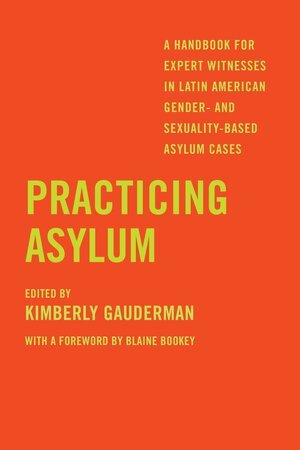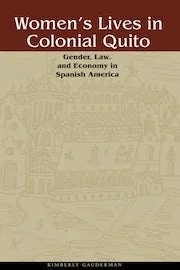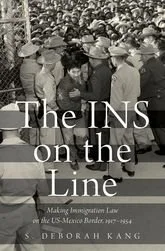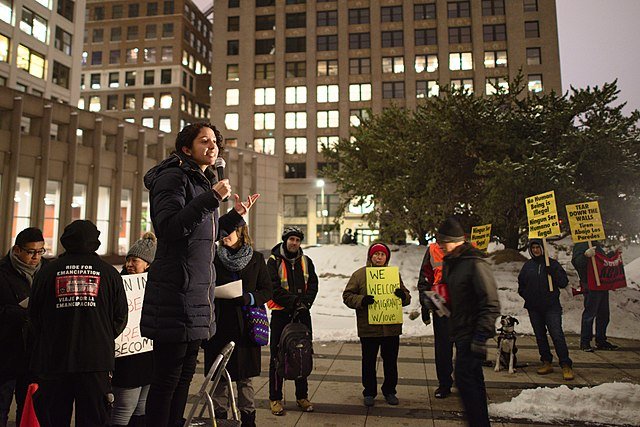Unsafe Harbor
America is turning away refugees — and falling short on its international commitments.
Read
The United States hasn’t overhauled immigration policy since the 1990s, even though most Americans agree the system is failing. And for thousands fleeing violence in Latin America, the consequences of inaction in Washington are treacherous. Will and our colleague Debbie Kang speak this time with a scholar fighting for asylum cases to get a fair shake, especially for women and LGBTQ applicants facing gender violence. With a backlog of nearly 2 million petitions, it’s a mammoth task.
Historian Kimberly Gauderman says applicants from Mexico, Central America and South America are are three times as likely to lose their asylum cases as petitioners from other parts of the world. With refugee policies that are stuck in a Cold War framework, she insists, the United States is violating international treaties and putting vulnerable people in harm’s way.
Twelve years ago, Gauderman got an unexpected email — one that she almost ignored, thinking it was sent in error. The writer was an attorney seeking help on an immigration case for a client from Ecuador. Could Gauderman provide expertise to support the case?
Absolutely, a colleague assured her. With that, Gauderman’s pro-bono work in the complex world of asylum law began. Now, her forthcoming volume offers advice from academics, advocates and lawyers, ranging from checklists and phone numbers to the history and social context of gender-based violence in Latin America.
The guide is both hopeful and practical. Gauderman says scholars from a range of humanities and social science disciplines have the just kind of deep knowledge, about the people and countries they study, to support asylum applications. She is committed to pushing the needle on an issue that American political leaders have left for immigration judges to sort out, often with life-and-death consequences.
Meet
Kimberly Gauderman is a historian at the University of New Mexico, where she specializes in early and modern Latin America as well as human rights and indigenous studies. She is a seasoned expert witness in asylum cases, particularly those involving women, children and LGBTQ applicants who experience sexual assault. Her forthcoming edited volume is Practicing Asylum: A Handbook for Expert Witnesses in Latin American Gender- and Sexuality-Based Asylum Cases (University of California Press, 2023). The book will be available free via Luminos Open Access.
S. Deborah Kang, our guest host, is an associate professor of history at the University of Virginia and a member of the Karsh Institute’s Nau Lab, which supports this show. She is the author of The INS on the Line: Making Immigration Law on the US-Mexico Border, 1917-1954 (Oxford University Press, 2017). Kang’s second book will be a history of U.S. immigration policies from the early 20th century to the present. She also advises federal public defenders and, formerly, served as a fellow at the U.S. Immigration Policy Center, housed at the University of California–San Diego. Follow Kang on Twitter @kangborderlaw.
Practicing Asylum features contributors from law, history, anthropology and other disciplines. In one chapter, Gauderman and a colleague recount the kind of horrific predicaments women find themselves in, often at the hands of their own partners and family members. The violence they describe is systemic and structural — not just interpersonal.
In 2017, Gauderman invited local community members at UNM to discuss the asylum process and access resources on expert witnessing. Attorneys who joined covered, among other issues, the basics of writing affidavits. Download Gauderman’s report on the event.
Besides providing expert testimony for asylum applicants, Gauderman works to raise awareness around sexual violence at UNM, as a leading member of SAFE — Faculty for a Sexual Assault Free Environment.
Earlier this month she oversaw a bilingual discussion with Wilma Gómez Luengo about her film Los niños del éxodo (“Children of the Exodus,” a documentary about the effects of the drug war on minors).
Gauderman’s first book, from 2003, is Women’s Lives in Colonial Quito: Gender, Law, and Economy in Spanish America. It argues against entrenched models for understanding early Ecuador through a patriarchal lens.
In the 2010 journal article “A Loom of Her Own: Women and Textiles in Seventeenth-Century Quito,” Gauderman offers a vision of Ecuador’s capital in a colonial period. Women regularly participated in cultural production and contributed to the thriving urban systems of labor, law and economy.
Watch Gauderman discuss her refugee work in 2021 as part of the Latin American & Iberian Institute’s Perspectivas Modernas video series. In prior public appearance, she explains the different roles witnesses and attorneys play in asylum cases, in a Mellon Fellowship panel in 2021.
Kang shows how border policy has been motivated by nativism as much as security concerns — in her first book, The INS on the Line.
Her research has helped to challenge sections 1325 and 1326 of U.S. Title 8. These laws prescribe criminal penalties for migrants who enter the United States without authorization. She recently filed an affidavit in several federal courts on the racial animus behind the original codification of these laws, and their subsequent reenactments.
Learn
The legal concept of “particular social groups” is the key to most asylum cases involving sexualized violence. Unlike petitioners who flee religious, political or ethnic oppression, those seeking protection as members of such social groups have a harder case to make in U.S. immigration courts.
Anataban drew inspiration from activists around Africa, especially the nonviolent Grifna movement in Sudan, to the north, which stood up against longtime dictator Omar al-Bashir. Al-Bashir was forced out of office in 2019 amid mass protests, but the military has since seized power.
Legal scholar Connor Cory shows how this designation applies to asylum seekers with non-normative sexual identities and orientations. Cory draws on queer theory and a close reading of immigration law to help attorneys paint compelling survival narratives in such cases.
Gauderman recommends the TRAC Immigration project, out of Syracuse University, for anyone looking to follow the latest data on asylum acceptance rates, and much more. TRAC stands for Transactional Records Access Clearinghouse.
She also cites Insight Crime, from American University, as a comprehensive source on organized crime across the Americas. Last year, Insight reported on how an appeals court ruled that former membership in the Salvadoran gang MS13 counted, for one applicant, as being part of a particular social group.
Visit the website of the UN’s High Commissioner for Refugees for the latest on Central America’s Northern Triangle: El Salvador, Guatemala and Honduras.
The Council for Foreign Relations estimates that more than 2 million people have fled the region since 2014. Most are driven by rising violence and poverty rooted in a history of colonialism and imperialism. These figures plunged in 2020 amid the covid pandemic, which brought new border restrictions, but they’re trending up again.
Former president Donald Trump used the pandemic as a wedge for ratcheting up draconian immigration policies, many of which remain in place under President Biden. The Pew Research Center explains the notorious Title 42. And — this just in: an order that would have blocked the Biden administration from ditching that rule is now on hold.
When an asylum application is denied, some petitioners seek “withholding of removal,” a last-chance legal route for avoiding deportation. But the bar for approval in these cases is no less high.
Because Congress has failed to revamp immigration policy for more than two decades, the U.S. Justice Department plays an outsize role in determining how asylum rules are enforced. In 2019, then–Attorney General William Barr declared that the immediate families of migrants in danger were no longer themselves eligible to apply for asylum.
Dara Lind of Vox tells the story behind the 1996 immigration law, which set the stage for today’s crises. This legislation forced more and more immigrants to live in the shadows. The law also made it easier to threaten migrants with deportation — creating a population of 11 million unauthorized residents.
You’ve probably noticed by now, this issue matters to us a lot. Catch up on past episodes about immigration, citizenship and border security: most recently “Criminal Laws,” with Debbie Kang. Plus … several … more.
A transcript of this episode will be available soon.












